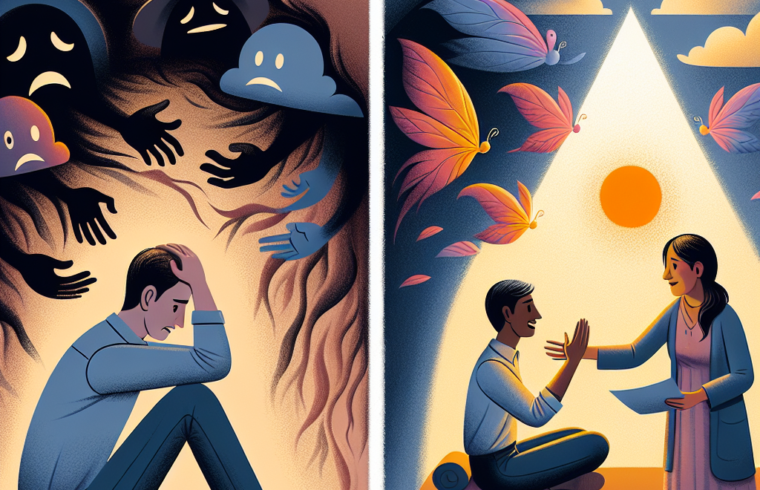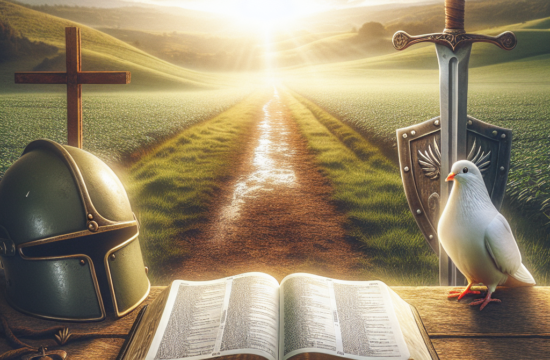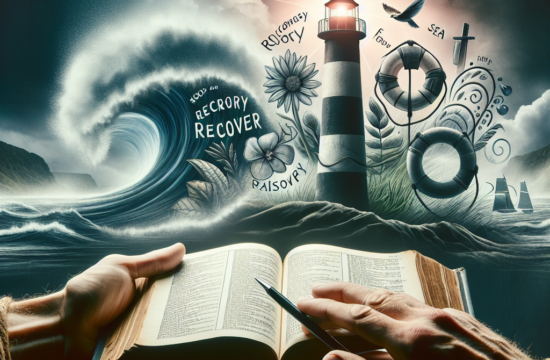==> Thank you for reading this post! Click Here If you are looking for support and Victory over PTSD.
Understanding PTSD and Its Impact
What is PTSD?
Hey there! So, let’s dive into this whole PTSD thing. Post-Traumatic Stress Disorder, or PTSD, is something that affects so many people. It typically arises after experiencing or witnessing a traumatic event – whether it’s something like combat, a serious accident, or even childhood trauma. It can leave folks feeling anxious, detached, and with haunting memories that just won’t go away.
You might be wondering, “How do I know if I have PTSD?” Some common symptoms include flashbacks, nightmares, and an overwhelming sense of dread. Understanding these symptoms is key because many people may not even realize they are dealing with PTSD until it starts to take a significant toll on their daily lives.
In my experience, the first step to healing is recognizing that PTSD is not just a personal weakness – it’s a legitimate mental health condition. So, when you hear someone say that PTSD is about feeling weak or broken, it’s time to have a real conversation about the truth of the matter.
The Daily Struggles
Living with PTSD can feel like you’re carrying a weight that you just can’t get rid of. Everyday tasks turn into mountains to climb. Friends or family might not always know what you’re going through, and it can lead to isolation. I remember those moments where even getting out of bed felt like an uphill battle.
You could feel hyper-vigilant, like you have to be on high alert all the time. This constant state of worry can lead to burnout. It’s exhausting! Finding a way to express these feelings is essential, either through journaling, therapy, or connecting with others who understand.
There’s also the emotional rollercoaster that comes with PTSD. You might be happy one minute and then feel a wave of sadness hit out of nowhere. Learning about these ups and downs can help normalize the experience and provide a sense of comfort. Trust me; you’re not alone in this!
The Importance of Support
Having emotional support is a game-changer when dealing with PTSD. I can’t stress enough how important it is to surround yourself with understanding people. Whether it’s friends, family, or support groups, having someone to talk to makes all the difference in the world.
Plus, sharing your experiences can provide catharsis. The more you talk, the more you heal. I’ve found that sometimes just a good chat over coffee with a friend can lift my spirits more than anything else. It’s the little things!
Furthermore, there are many resources out there now. Online forums, local support groups, or even professional counseling can create a robust support network tailored to your needs. It’s about finding what clicks for you and running with it.
Build Connections with Empathy
Finding Your Tribe
When you’re dealing with PTSD, finding people that actually get it can be such a relief! There’s a unique bond that forms when you share experiences. I’ve met folks who’ve been through similar situations, and just being able to express myself without judgment felt amazing.
Look for support groups, either in-person or online. There’s a whole community of survivors out there willing to listen. It’s comforting to realize you’re not isolated in your journey. Sharing stories can provide inspiration and hope when things seem bleak.
Remember, connecting doesn’t mean you have to spill your guts all at once. You can take baby steps and share at your own pace. It’s your story to tell, and there’s no rush in finding the right words!
Empathy Can Heal
Empathy is such a powerful tool. When we encounter someone who really sees us and what we’re going through, it creates a sort of magic. It breaks down walls and allows for genuine connection. Practicing empathy, both for yourself and others, can be transformative.
Have you ever had someone say, “I can’t even imagine what you’re going through?” That’s empathy! It fosters a relationship that feels safe and supportive. Just knowing someone is willing to walk alongside you in your struggles is a huge boon to emotional health.
As you build connections, remember to practice self-empathy too. Treat yourself with kindness and understand that healing takes time. Some days will be tough, but that’s okay. You’re navigating a challenging path, and you deserve all the grace you can give yourself.
Developing Healthy Relationships
Healthy relationships, oh boy, these are critical! Building connections with those who uplift you and understand your triggers can make a world of difference. In my life, it’s been about surrounding myself with positive influences, and it’s honestly been life-changing.
Boundaries are worth mentioning too. It’s okay to say no or to take a step back if a relationship is draining. I’ve learned that establishing boundaries protects my mental space and allows my relationships to flourish.
In essence, cultivating relationships that nourish your soul can lead to a more profound sense of security and acceptance. Networking with supportive individuals who value mental well-being creates an environment where healing is not only possible but encouraged.
Seeking Professional Help
Therapy Options
When it comes to managing PTSD, seeking professional help can be the best decision you ever make. Therapy often helps you unpack what you’re feeling in a safe environment. I remember my first therapy session – I was so nervous, but the release I felt after years of bottling it all up was indescribable!
There are different types of therapies for PTSD, like Cognitive Behavioral Therapy (CBT) and Eye Movement Desensitization and Reprocessing (EMDR). Each type of therapy has its own approach and benefits, so it’s worth exploring what resonates with you best.
Don’t be afraid to try a few different therapists or therapy styles before finding your groove. There’s no shame in figuring out what works—you deserve to feel comfortable and understood while you’re on this journey!
Get Support and Help with Recovery! Visit us for more Information and Support
Medication as a Support Tool
For some folks, medication can be a helpful addition to therapy. That’s a personal choice and one that requires discussion with a healthcare provider. I’ve seen how medications can stabilize mood and reduce anxiety, but it’s essential to find the right fit for your needs.
There are many different medications out there, each with various effects and side effects. It can seem overwhelming, but having an open dialogue with your doctor can help demystify things. You’re the captain of your ship; don’t hesitate to steer it towards what feels right for you!
Finding that perfect medication can sometimes take time, and that’s totally okay! Be patient, and don’t hesitate to vocalize any discomfort or side effects — your healthcare team is there to support you!
Self-Care Practices
Engaging in self-care is non-negotiable when you’re dealing with PTSD. It’s not just bubble baths and cute candles (although those are nice!). It can be about creating a routine that feels comforting and secure. For me, incorporating mindfulness practices, like meditation or yoga, has transformed my emotional landscape.
Exercise, even if it’s just a walk around the block, can help release those feel-good endorphins. It doesn’t have to be an extensive workout — do what feels good and honor your body’s needs. It’s crucial to connect physical activity with your healing process!
Lastly, don’t underestimate the power of creativity in your self-care toolkit. Writing, painting, or playing music can be unbelievably therapeutic. Embrace what brings you joy, and let that love shine through as part of your healing journey.
Resilience Through Time
Building Coping Strategies
Resilience doesn’t happen overnight; it’s a gradual process that you build over time. One of the best ways to cultivate resilience is by developing coping strategies that work for you. Whether it’s using breathing exercises when you feel anxious or journaling to sort through your thoughts, find what clicks!
Make a list of activities or approaches that make you feel grounded—these could be anything from a playlist that lifts your spirits to spending time in nature. The key is to reach for these tools when you feel overwhelmed. It’s a way of fortifying your armor against the onslaught of PTSD symptoms.
Remember, resilience may ebb and flow; that’s completely normal. Acknowledge the tough days and don’t forget to celebrate your wins, no matter how small. Each step you take is a victory worth recognizing!
Setting Goals
Setting goals is a powerful way to give yourself direction while navigating PTSD. Start small and gradually build as you accomplish each milestone. I’ll be honest; at first, my goals were simple: getting out of bed and taking a shower. It’s about progress, not perfection!
As you reach those smaller goals, you’ll build the confidence to tackle bigger ones. It’s amazing how momentum can build over time, creating a sense of accomplishment and pride in your healing journey. Plus, sharing your goals with someone can add an element of accountability, which can be incredibly motivating.
Remember, the goals you set should be tailor-fitted to you—there’s no one-size-fits-all here. Listen to your heart and proceed at a pace that feels comfortable for you. Life isn’t a race; it’s your journey!
Celebrating Progress
Celebrate every little victory! Whether it’s recognizing when a day goes better than expected, or when you reach an important milestone in therapy, take the time to acknowledge your growth. I’ve found that recognizing my progress, even small ones, can provide a significant boost for my mental health.
Look for ways to commemorate your progress. Maybe it’s treating yourself to a nice dinner or taking a moment to reflect on how far you’ve come. Creating rituals around your achievements can reinforce your resilience and keep motivation alive.
Each step forward is a testament to your strength. Owning those accomplishments can help solidify your positive mindset and remind you that healing is a journey filled with beautiful challenges and triumphs.
FAQs
1. How can I tell if I have PTSD?
Symptoms of PTSD can vary but often include flashbacks, nightmares, severe anxiety, and uncontrollable thoughts about the traumatic event. If you resonate with these feelings, seeking professional help is a great first step.
2. What forms of emotional support are available for PTSD?
Emotional support can come from many avenues, including friends, family, support groups, or professional therapy. Engaging with those who understand your experience can foster healing and connection.
3. Is it normal to feel overwhelmed with PTSD?
Absolutely! Feeling overwhelmed is a common symptom of PTSD. It’s important to acknowledge these feelings and reach out for support, whether through therapy, support groups, or friends.
4. Can therapy help with PTSD?
Yes! Many people find therapy to be incredibly beneficial. Therapists can help you process your experiences and develop coping strategies. The key is to find a therapist you feel comfortable with.
5. What self-care practices can I adopt for PTSD?
Self-care practices vary for everyone, but incorporating mindfulness, exercise, creative outlets, and establishing routines can be effective. Find what resonates with you, and make it a priority in your healing journey.













